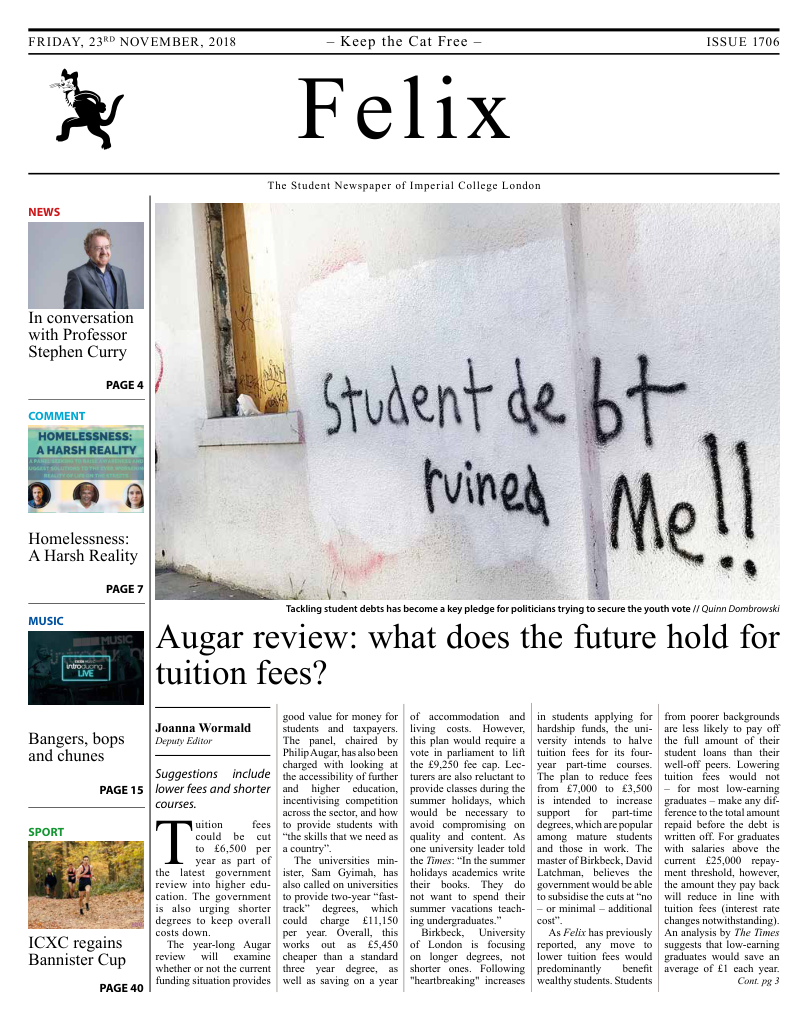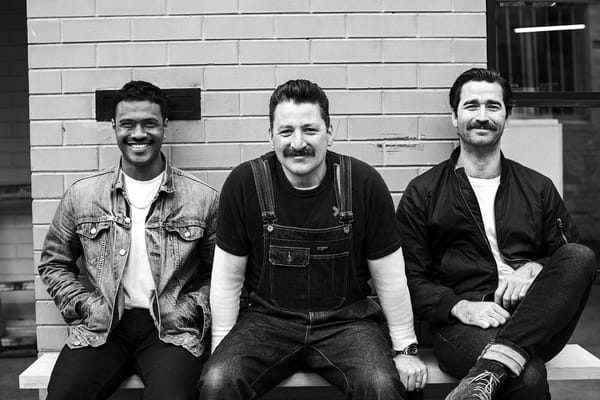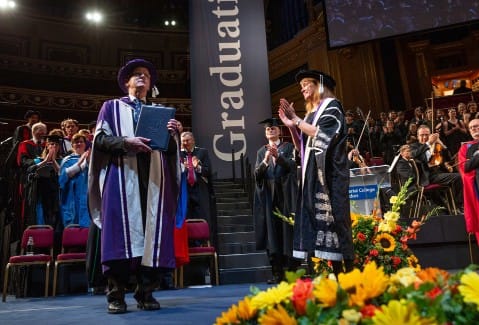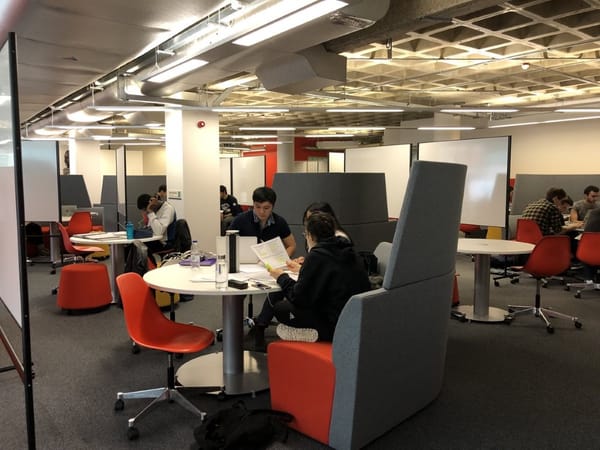In conversation with Professor Stephen Curry
Felix sat down with Professor Stephen Curry, the Assistant Provost for Equality, Diversity and Inclusion, to reflect on Imperial's Equality, Diversity and Inclusion Strategy

With the recent publication of Imperial's Equality, Diversity and Inclusion (EDI) Strategy and Imperial's launch of the Race Equality Charter survey, Felix sat down with Professor Stephen Curry, for an exclusive interview.
Felix: I wanted to get your take on the strategy for Equality Diversity and Inclusion. If you could give some background to it: where did it come from, the steps that have been taken to get it to the point that it’s at now and to describe the point that it’s at now?
Stephen: Well the point that it’s at now is that it’s just been published. Where did it come from? It apparently came from the creation of the position that I occupy. I wrote the strategy as Assisant Provost for EDI and that’s a new position at the College. I started in October last year, so I’ve been in it just over a year. It had also been sparked by the institutional culture review which happened a few years ago and was actually triggered by an incident that happened between the Men’s and Women’s rugby teams. Now, in the end, although what triggered it was an incident between student societites, actually the report focused largely on the culture within departments and the working environment for staff here. One of the things they noticed is the perception of many staff is that Imperial is a highly competitive working environment- that’s kind of what you’d expect from an institute that’s research intensive, that is world class, that operates in a globally competitive market. But there was a sense that... what was missing was an emphasis on collaboration, on empathy, on actually understanding the pressures that people work under and the sorts of behaviours that can lead to and engender.
I am really interested in the culture of science and how universities work and the value that they offer to society. They’re supposed to be agents of social mobility and, in a ways, they’re not really doing that nearly as well as they could and should be. I’ve spent a lot of time in the first few months talking to lots of different people at all parts of the university to get a sense of what are we doing well across this agenda and what are we not doing enough and that was the basis of starting then to write the strategy. The strategy was developed with lots of consultation with lots of different people and one other thing to appreciate is, coincident with the creation of this position, the way that the College oversees work on EDI was changed and there are now two primary committees that oversee that. There’s an EDI strategy group, which is chaired by the Provost. I sit on that but it also has the Faculty Deans and there’s about a dozen people on it, all quite senior. That was deliberately kept a relatively small group so that it had focused discussion and executive authority. In parallel with that, we set up an EDI Forum and that is deliberately a much more representative body and people from all over the College, different academic departments, different administrative departments, professors and students are on it. There’s lots of representation around the table there. The forum I see as a representative group and a kind of listening post to basically pool information from ground level up. So the forum was very much involved in helping to draft it as well. I came up with a skeleton outline in January, which was discussed at the strategy group and then it was developed and then it was discussed again at the forum and then it had another discussion at the strategy group in May and then a fully developed version was then presented to the Provost’s board at the end of June for approval and then adoption.
Clearly, we want to be as inclusive as possible so that, whoever you are, if you apply here and you’ve got the wherewithal to study the courses or to do the research, then we want you. There’s clear evidence that, if you bring people from other backgrounds and perspectives, that can help you generate a much more creative approach to how you research, how you teach and also helps to dictate what you research, what you teach. If we start asking different questions then people who don’t normally look to Imperial as a place where they might go might say, "actually the stuff they’re interested in is the stuff I’m interested in" and so that becomes then a pull on them.
Over the summer it was refined and it was also discussed in the President’s Executive groups. We got a version that’s published. We’ve been rolling it out with announcements. Chi Onwurah came on the 11th and I deliberately invited Chi because she chairs an all party parliamentary group on diversity in STEM, which is newly created this year. She’s also an alumna of this university, She was a woman at Imperial; she was a black woman at Imperial and she was the only person in the room of those characteristics for a lot of the time. Didn’t have a very happy time at Imperial and is very clearly invested in this area and had said, basically, that a lot of Russell group universities simply aren’t doing enough yet in terms of opening the doors to underrepresented minorities. If you invite an MP, I kind of figured it’s a good way to launch it and show that we are really interested in starting conversation about this and I would like to try and ramp up the number of events that are promoting prolonging this conversation and getting people involved in participating.
We now have a strategy. There are 7 major elements to it, the “We Will” statements detailed in the document. The document also then has an action plan and the action plan has owners who are distributed all across the College, all the way from the President to Heads of Department. Now this is just a piece of paper at the minute, and it was hard enough work to do that, let me tell you. But the hard bit starts now because the hard bit is delivery and that’s where we need to focus now.
In a lot of places, Imperial has the right sentiment behind what they say but it almost comes across as they’re paying lip service to it... in terms of actual things happening, there’s very slow progress if any progress is made at all. How do you plan to implement the "We Will" statements?
Some of it is in the action plan. Some of it, to be frank, we haven’t worked out exactly how we’re going to do it but there are certain targets that we want to try and achieve so we have real action. I’m very aware that you can write a lot of fine words in a strategy and nice aspirations, and I agree that in this space, talking about EDI around the higher educational sector generally, not just in the UK but across the world, people have been talking about these issues for a long time. If you talk to women academics, they’re incredibly frustrated; we know what the problems are to a large extent but we don’t really see a big pace of change. One of the difficulties is there isn’t a silver bullet that solves this. What we’re dealing with is a society that has many structural inequalities built into it and we are a product of that society. Now, as a university, I would like to think that we were a space that actually challenged the norms of society and says, "we can do better", and start to lead the conversation in doing that. Oxford and Cambridge attract a lot of attention because everybody’s heard of Oxford and Cambridge, so they get it in the neck in the press in terms of numbers of women, numbers of black students that they have, but our numbers, I’m afraid, aren’t really significantly different from theirs. We can be grateful for their existence because they take a lot of the heat, as it were. We have to be very clear-sighted and look at our numbers and see what it is that we’re doing. On admissions for example, we know we have issues with attracting certain minority groups and there is, I would say, very much a renewed determination that we’re going to have to change that.
We also know that the reality is, we are losing out on talent and that’s the argument that I would always make about striving to increase diversity. We have lots of privately educated kids, lots of white male students, many of whom have had socio-economic advantages even if they didn’t go to private school. But there are many communities where there are lots of bright kids but, for one reason or another, they simply don’t look to Imperial as a place that they would go. They don’t see other people who look like them here and that puts them off and we have work to do to counteract that. It’s not College policy yet but, personally, I would like to move to a situation where we are doing a much better job of providing context sensitive offers to students. I think if you just think about “we will take people on the basis of their A level results because that’s a good measure of how good they are”, that’s an incomplete measure of how good they are. Your A level results is basically a result of your innate abilities multiplied by your social advantages or disadvantages. I think we have to recognise that it’s not a matter of compromising on standards. Increasing diversity is not about saying “oh well, we let in a few minority students because it looks good". That’s really not the position we’re taking. The strategy makes it clear that there are groups of talented students out there that we’ve been neglecting and that we’re not really open to and it’s about recognising that, actually, they’re every bit as good as the students that come here but we’re not doing a good enough job of recognising the talents that they have. Now how we do that is a complicated process. Some of it will be our admissions processes, some of it will be about actually going out and doing outreach and showing people that you should be aspiring to Imperial College, you have got it in yourself. There’s an issue with not enough girls doing physics for example and that’s because they get the message early on, sometimes from their parents, sometimes from their teachers, that “girls don’t do physics” and nonsense like that. But there are many other areas where people get that message and those are things that we have to fight against. So there has to be movement across broad fronts, which is why the problem is deep seated, the solutions are multidimensional and complex and I do hope that the strategy gives us a framework to be more coherent and more joined up in our approach. We are going to take various steps, we’re not entirely sure that those are going to be the right steps to take. We will remain open to challenge and, if we get things wrong, then we will hold our hands up and say “ok that doesn’t seem to be working, we’re going to try something else”. There’s an inherent problem in any large organisation that people don’t know how it really works. That’s a problem of communication and it’s a problem that we need to tackle. People very readily get very cynical about “why is the university doing this?”, “is this just so we can produce a nice, glossy brochure with a picture of a disabled person on the front of it or a black member of staff?", "is this just PR?”. I very much hope it’s not. I am determined as far as I am able to make sure that this is about real change. Very much the ethos of the strategy is that promoting EDI is the responsibility of everybody who comes to work or study here. It’s everybody’s responsibility from the President to the very last undergraduate who’s come through our doors. It has to be about community, it has to be about the culture of the place. We know there are many issues we have to tackle. There will be endless arguments over this. We will not move fast enough for some people. We will be moving too fast for others that... don’t really understand the different experiences that other people have. I think that is one of the issues in universities - they’re dominated by white men. One of the things I want to do is to make sure those other voices are heard.
You mention that universities are dominated by white men. It’s kind of funny that the person in charge of EDI is a white male.
You’re right, it does feel slightly anomalous. We produced a leaflet to get members of staff to complete the Race Equality Charter survey and it had my face on it! It is a bit odd and that is an issue but I think there’s value, at least temporarily, in that you have somebody who is a white man, who is prepared to take these issues seriously and to speak to his colleagues about it. One of the important things I can do is to help enable other voices to be heard. I’ve been shocked to learn about the experience of other people. From women about how prevalent sexual harassment is in higher education. I have no experience of it whatsoever but I know, from talking to women, that it is a big, hidden issue.
Universities are communities, the word university means community of students and scholars and I think we have, to a degree, lost sight of that. Because of the way that government accountability is now enforced, universities have become more managerialist in a way and a bit more corporate, rather than a bit more communitarian and I am determined to try and push things in the other direction.
What does diversity mean to you specifically and what are your priorities?
Diversity is about recognising and valuing difference and the fact that people are different, bring different things to a university experience. It’s also about us being much more cognisant of the fact that people can be very different from us but have really fantastic things of value to offer us and experiences and perspectives and insights from their lived experience that bring real value to a university and clearly have every bit as much talent as anybody who conforms to the “norm” view. Inclusion is really an important part of that because it’s not enough that you are getting people in the door. You have to make sure that, when they are here, that they don’t feel excluded in any sense, that they’re not treated or subject to microaggressions of any sort. Things like that... degrade the day-to-day experience of people who are generally from underrepresented groups and that’s a hard problem to crack. We are a product of a society that’s fragmented in many ways.
Everybody has a limited set of experiences and actually one of the great purposes of university in the modern age in a big metropolitan centre like London ought to be to enable people to come together and we do that. There’s a lot of good stuff happening, it’s not all doom and gloom. Imperial is very international and that’s one of the great things about, I would hope, being here as a student is that actually there is a good mix of different people. It’s not the entire mix that we would like necessarily but there is that.
I have a slightly funny position here. I’m Assistant Provost but I don’t have a big team under me. In a way, I kind of almost see myself as being appointed to a position as a professional campaigner within the university and my job is to campaign and persuade people that this is important, this is why we need to do it, there’s real value here and to negotitate that. The thing I want to really achieve is to make sure anybody who’s in a managerial position is really invested in this. I just want to make sure that everybody is talking about these issues and aware of them. Ultimately it will be seeing a change in number, I want to see more women academics in senior positions here, I was to see more BME staff in senior positions here, I want more BAME students to come here.









